
For small and medium-sized enterprises (SMEs), an effective sales funnel is the backbone of a successful marketing and sales strategy. It guides potential customers through the journey from awareness to conversion, ensuring that every stage nurtures and engages them effectively. This blog will explore actionable tips for building a high-performing sales funnel, supported by a real-life case study from SME Scale, and delve into the psychology that makes these methods successful.
What is a Sales Funnel?
A sales funnel represents the journey a potential customer takes from their first interaction with your business to becoming a loyal customer. It typically consists of four stages:
Awareness: The stage where potential customers discover your brand.
Interest: Building interest through valuable content or engagement.
Decision: Convincing the prospect that your product or service is the best solution.
Action: The conversion point where the prospect becomes a paying customer.
Why SMEs Need a Strong Sales Funnel
A well-structured sales funnel helps SMEs:
Optimize Lead Generation: Attract qualified leads rather than a general audience.
Increase Conversion Rates: Guide prospects through the decision-making process effectively.
Save Time and Resources: Focus efforts on high-potential customers.
Build Long-Term Relationships: Foster trust and loyalty through personalized interactions.
Tips for Building an Effective Sales Funnel
1. Understand Your Target Audience
The foundation of a great sales funnel is knowing your audience. Use customer personas to identify their needs, challenges, and motivations.
Tip: Use analytics tools to track visitor behavior on your website and gather insights into their preferences.
2. Create Value at Every Stage
Each stage of the funnel should provide value, encouraging prospects to move closer to conversion. For example:
Awareness Stage: Publish blog posts, infographics, or videos addressing customer pain points.
Interest Stage: Offer downloadable guides or webinars in exchange for email addresses.
Decision Stage: Provide case studies, testimonials, or free trials.
Action Stage: Use clear and compelling calls-to-action (CTAs) to prompt purchase decisions.
3. Leverage Automation
Automated tools like CRM systems and email marketing platforms streamline the process, ensuring timely follow-ups and consistent messaging.
Tip: SME Scale offers automation solutions that save time and improve efficiency by integrating CRM tools with sales funnels.
4. Optimize Your Website
Your website is the gateway to your sales funnel. Ensure it’s fast, mobile-friendly, and easy to navigate.
Tip: Incorporate landing pages with persuasive copy and minimal distractions to capture leads effectively.
5. Use Retargeting to Re-Engage Prospects
Not all prospects convert immediately. Retargeting through email campaigns or social media ads can bring them back into the funnel.
Tip: Include personalized offers or reminders to reignite interest.
Case Study: How SME Scale Built a Sales Funnel for a Toy Company
The Challenge
A toy company specializing in educational products struggled to convert website visitors into paying customers. They lacked a clear funnel strategy, resulting in low engagement and high bounce rates.
The Solution: A Tailored Sales Funnel
1. Awareness Stage
SME Scale helped the toy company create blog content targeting parents and educators, such as “Top 10 Educational Toys for Kids in 2024.” These posts were optimized for SEO, increasing organic traffic.
2. Interest Stage
The company offered a free eBook, “How to Foster Creativity with Educational Toys,” available for download in exchange for email addresses. This lead magnet captured hundreds of emails within weeks.
3. Decision Stage
SME Scale added a “Customer Stories” section to the website featuring testimonials and video reviews from satisfied customers. These real-life success stories built trust and encouraged decision-making.
4. Action Stage
A limited-time 20% discount for first-time buyers was promoted through email campaigns and retargeting ads, driving conversions.
The Results
A 150% increase in email leads within three months.
A 40% increase in conversion rates from website visitors to paying customers.
A 30% reduction in bounce rates, indicating higher engagement.
The Psychology Behind Effective Sales Funnels
Understanding customer behavior and psychological triggers is key to designing a successful sales funnel:
1. Reciprocity
Providing free value (like eBooks or guides) encourages prospects to reciprocate by engaging with your brand or making a purchase.
2. Social Proof
Testimonials, reviews, and case studies validate your product’s effectiveness, reducing hesitation and building trust.
3. Scarcity and Urgency
Limited-time offers or exclusive deals create urgency, compelling prospects to act quickly.
4. Authority
Positioning your brand as an expert through educational content builds credibility and trust.
5. Commitment and Consistency
Small commitments (like subscribing to a newsletter) increase the likelihood of larger commitments (like purchasing a product).
Why Partner with SME Scale?
Building an effective sales funnel requires expertise and the right tools. SME Scale specializes in creating tailored sales funnels for SMEs, combining AI-powered insights, SEO optimization, and automation tools to deliver measurable results. Whether you’re starting from scratch or optimizing an existing funnel, SME Scale ensures your business achieves sustainable growth.
Conclusion
A sales funnel is not just a marketing tool; it’s a strategic framework for nurturing prospects and converting them into loyal customers. By understanding your audience, delivering value at every stage, and leveraging automation, SMEs can create high-performing sales funnels that drive growth.
If you’re ready to take your sales funnel to the next level, contact SME Scale today. Let us help you design a strategy that maximizes conversions and grows your business.
FAQs
1. How long does it take to build an effective sales funnel?
Building a sales funnel can take a few weeks to months, depending on the complexity and resources available.
2. What tools are essential for sales funnels?
Tools like CRM platforms, email marketing software, and analytics tools are crucial for managing and optimizing your sales funnel.
3. How can I measure the success of my sales funnel?
Track key metrics like lead conversion rates, bounce rates, and customer acquisition costs to evaluate performance.
Need help building your sales funnel? Visit SME Scale to get started today!


